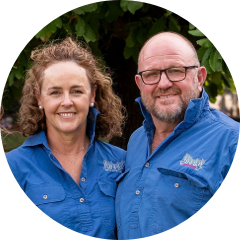Drought resilience practices in mixed farming systems
This project was completed in 2023.
WHY THIS PROJECT WAS IMPORTANT
Consultation with producers and advisors, through Victoria Drought Resilience Adoption and Innovation Hub activities, identified common gaps in the application and use of livestock containment across South Australia, Victoria and Tasmania.
The overarching interest was to determine if stock containment could be used more strategically, to not only manage livestock and groundcover during drought, but to also capture synergies and opportunities between the pasture and crop systems in other periods to build resilience in the farming business.
In short: This project provided support to cropping and livestock farmers across Victoria, South Australia, and Tasmania, to enhance pasture management and drought resilience. It focused on containment feeding strategies, trigger point identification, real-time monitoring tools, and the integration of dual-purpose plants into cropping rotations.
Project focus
This project aimed to fast-track direct support to cropping and livestock farmers across Victoria, South Australia and Tasmania in the management of pastures and use of livestock containment and feeding systems for drought resilience.
Of particular interest was:
- The most appropriate containment feeding approaches for different farming systems and locations.
- The trigger points to make decisions to place livestock into containment, that optimises the profitability and resilience of the farm system, to ensure decision points are planned and decisions are made early.
- Real-time information and tools to assist in warning when trigger points are approaching, so producers can make decisions earlier (i.e. real-time, high-resolution satellite monitoring to help inform groundcover estimates.
- New dual-purpose plants which could be introduced into cropping rotations to provide crop benefits in good years, but provide ‘bridging fodder’ alternatives in dry years (to explore new species that provide crop and livestock flexibility.
The use of demonstrations, activities and outputs in this project helped improve farm decision making and led to improvements in soil cover and livestock welfare and nutrition in periods leading into, during and post drought.
This project also aimed to equip farmers and advisors with tools and regionally appropriate trigger points to make good drought-related decisions. The project focussed on the timing and decision to use containment feeding and fodder management to preserve soil condition, pasture survival, animal welfare and to optimise profitability and recovery after the drought breaks.
For more information about the project, download the Vic Hub factsheet here.
Project outcomes
Stock containment area field day
On 15 March, 2023, Riverine Plains ran a stock containment area (SCA) field day at two demonstration sites near Violet Town. Livestock producers from around the district came together to share ideas and recommendations, and to discuss their previous experiences in using SCAs. Advisers with expertise in animal health, stock management, containment area design, nutrition and agronomy spoke and lead discussions with the group.
Thank you to Kate Rowe and Nick Linden from Agriculture Victoria, Tom Wallis from Peter Davis Rural, and Jason Trompf for speaking at the event. Thank you also to Don Piper and Peter Holmes for generously hosting the two demonstrations and sharing their insights.
Decision making workshop
Cam Nicholson, Nicon Rural Services, led a series of decision-making workshops at Dookie, Rutherglen and Savernake during late March. The workshops were designed to help farmers better understand their decision-making process when moving stock out of paddocks and into containment areas.
During these workshops Cam, along with Riverine Plains’ Project Officers Jane McInnes and Sophie Hanna, worked with farmers to identify critical factors in the decision-making process and their associated tipping points. With these in mind, the group developed decision matrices as tools to focus thinking, allow transparency of thoughts with others, refine the information and skills required, and empower decisions to be made with confidence, repeatedly.
Find out more
For further information, please contact Riverine Plains Livestock Project Officer, Sophie Hanna by emailing sophie@riverineplains.org.au
Project investment
Partners
MORE ON Drought & Livestock
Our research enhances food production, increases environmental resilience and improves community connection across the Riverine Plains. See how our research creates impact.
-
Livestock
Sustainability
-
Grains
Livestock
-
Grains
Livestock
-
Drought
-
Drought
-
Drought
Livestock
-
Sustainability
Drought
-
Drought
Livestock
-
Livestock
Fodder
-
Drought
Grains
-
Livestock
Drought
-
Drought
Livestock
-
Drought
People
-
Livestock
Grains
JOIN RIVERINE PLAINS
Riverine Plains provides opportunities to see new research and innovation, connect with rural communities, and attend informative events.


